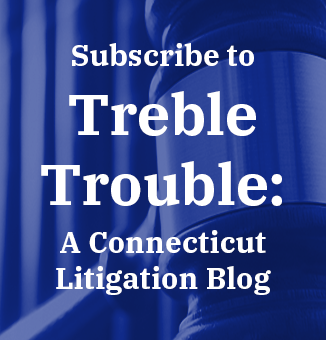Treble Trouble: A Connecticut Litigation Blog
Appellate Court Rejects Constitutional Challenge to Connecticut's Anti-SLAPP Statute, Extends Quasi-Judicial Defamation Immunity to Federal Employee Grievance
December 30, 2024 - Authored by Eric Del Pozo
The Appellate Court’s recent decision in Robinson v. V.D. has a little something for any practitioner who deals with questions of constitutional law or civil procedure. Among other things, the decision held that statements made in a federal employee’s union grievance were absolutely immune from defamation liability, concluded that this immunity defense is nonwaivable, and upheld the legislature’s prerogative to craft an expedited judicial process to dispose of meritless lawsuits filed in response to protected expression. Like several law school classes rolled into one, the opinion has lessons for novice attorneys and seasoned practitioners alike.
>> Read full alert
Unfairness, Identity Theft, and Treble Damages After FCW Law Offices
September 23, 2024 - Authored by Patrick M. Fahey and Matthew B. Gibbons
Earlier this month, the Connecticut Appellate Court clarified the law regarding the interaction of enhanced damages available under different statutes. In Frank Charles White v. FCW Law Offices, the court held that, although trial courts must treble damages for a prevailing plaintiff under the statutory action for identity theft, they may not award both statutorily enhanced damages and damages under the Connecticut Unfair Trade Practices Act (“CUTPA”) based on the same underlying conduct. Thus, an award of damages for identity theft is now exclusive of a damage award under a separate count for a CUTPA violation based on the same conduct, despite the unfairness and deception involved in identity theft, as a matter of law.
>> Read full alert
Merchant Cash Advance Litigation in Connecticut
August 20, 2024 - Authored by Matthew B. Gibbons and Mark K. Ostrowski
The recipients of some merchant cash advances have an opportunity to defend, and even counterclaim for treble damages and attorneys’ fees, when funders of certain loans characterized as merchant cash advances sue them in Connecticut. But it appears that most recipient defendants default, or negotiate a resolution instead. By failing to raise these defenses and assert counterclaims, these recipients are surrendering valuable leverage during the resolution process.
Fairly recently, Connecticut seems to have become a favored jurisdiction for “merchant cash advance” funders, who require Connecticut law to govern their contracts. They also, sometimes, require or allow for lawsuits based on those contracts to be brought in Connecticut state courts.
>> Read full alert
The U.S. Supreme Court Halted Judicial Deference to Federal Agencies' Statutory Interpretations: What Comes Next?
August 8, 2024 - Authored by Eric Del Pozo
In June 2024, in Loper Bright Enterprises v. Raimondo, the U.S. Supreme Court sunk what remained of Chevron deference. Under that doctrine, tracing back to the 1984 decision Chevron U.S.A., Inc. v. Natural Resources Defense Council, Inc., courts gave binding weight to federal agencies’ formal interpretations of ambiguous statutes that those agencies administered. Extending mainly to interpretations contained in promulgated regulations, Chevron deference attached equally to an agency’s views about the scope of its own power as to its legal determinations reached when exercising that power—a double whammy.
Loper Bright represents Chevron’s unambiguous epitaph. In aiming to settle questions about judicial review of agency action, however, this watershed decision may have generated many more.
>> Read full alert
Connecticut Appellate Court Reaffirms Vitality of Standalone Equitable Cause of Action for Discovery
November 7, 2023 - Authored by Eric Del Pozo and Matthew B. Gibbons
Discovery in this State aims for full and fair disclosure—even before a substantive dispute hits the docket. Nestled in the Practice Book chapter on discovery and depositions is a subsection governing responses “to complaints in the nature of bills of discovery in equity.” Conn. Prac. Book § 13‑18. Given this provision, the curious practitioner may ask what exactly “bills of discovery in equity” are. In Nowak v. Environmental Energy Services, 218 Conn. App. 516 (2023), the Appellate Court provided some answers.
>> Read full alert
Connecticut Regulators Are Coming for Unlawful Cannabis Sales
September 7, 2023 - Authored by Eric Del Pozo, with contributions from Sarah Westby
In Connecticut's evolving world of recreational cannabis regulation, one thing seems increasingly clear: Regulators have made a priority of patrolling the market and will readily take enforcement steps against unlicensed cannabis sellers or those whose products otherwise violate state law.
>> Read full article, published by Law360, reprinted by permission
Connecticut Modernizes Interstate Discovery Process
July 21, 2023 - Authored by Eric Del Pozo and Matthew B. Gibbons
Few litigation tasks have imposed as many hurdles of substantial cost but questionable necessity as attempting to take civil discovery in one State for use in a lawsuit in another. Thankfully, Connecticut recently joined the nationwide trend towards modernizing interstate discovery by enacting the Connecticut Interstate Depositions and Discovery Act (CIDDA). Codified at sections 52‑655 to 52‑660 of the General Statutes, the CIDDA applies to all discovery requests in proceedings pending on or postdating July 1, 2023.
>> Read full post
Connecticut Supreme Court Reaffirms "Transferred Intent" Theory of Discrimination
July 14, 2023 - Authored by Daniel A. Schwartz and Eric Del Pozo
In Hartford Police Department v. Commission on Human Rights & Opportunities (HPD v. CHRO), the Connecticut Supreme Court upheld the agency’s post‑hearing finding that a police department had unlawfully terminated a probationary officer due to discriminatory animus displayed by, and imputed from, a supervisor other than the final decisionmaker.
>> Read full post
Connecticut Enacts Major Expansion of State's False Claims Act
June 27, 2023 - Authored by Eric Del Pozo and Matthew B. Gibbons
Amid this year’s last-minute budget negotiations, Connecticut’s legislature found something on which nearly all members could agree in the bipartisan, sweeping expansion of the State False Claims Act (FCA). Signed into law by the Governor, the changes will take effect on July 1, 2023. >> Read full post


